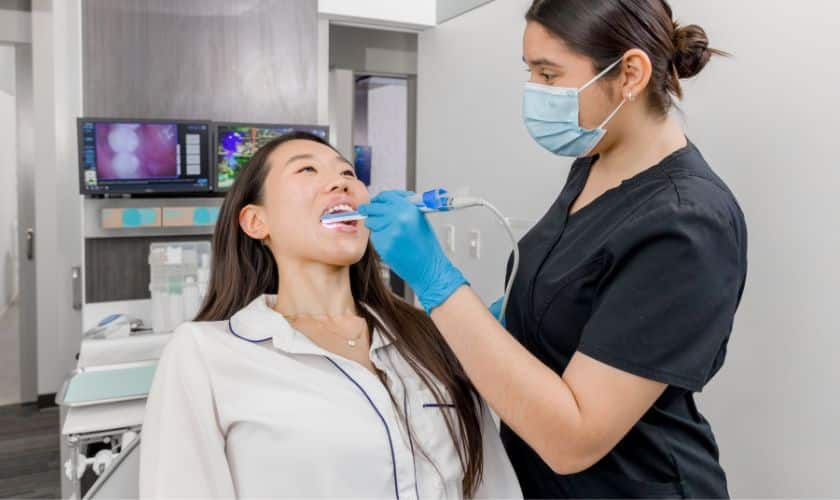Pearl Dental Blog

The Serene Smile: Journey into the World of Sedation Dentistry
Welcome to the world of sedation dentistry, where the serene smile awaits you. Embark on a transformative journey that will change the way you perceive dental care. Sedation dentistry offers a unique approach that focuses on your comfort, relaxation, and peace of mind during dental procedures. Say goodbye to dental anxiety and fear as you explore the various sedation techniques designed to create a serene environment for your dental visit. Discover the wonders of conscious sedation, oral sedation, or nitrous oxide to experience a stress-free, pain-free dental experience. Join us on this remarkable journey into the world of sedation dentistry, where the serene smile awaits you.
Sedation Dentistry: Overview
Sedation dentistry is a specialized approach that helps patients relax and remain calm during dental procedures. It involves the use of medication to induce a state of relaxation, reducing anxiety and discomfort. Various sedation methods, such as oral sedation, nitrous oxide (laughing gas), and intravenous (IV) sedation, are available to accommodate different levels of dental anxiety and treatment needs. Sedation dentistry allows individuals with dental phobia, sensitive gag reflexes, or extensive dental work to receive the care they need comfortably. Under the supervision of a trained professional, patients can experience a stress-free and serene dental visit, ensuring optimal oral health and a confident smile.
Multiple Options In Sedation Dentistry
1. Nitrous Oxide Sedation (Laughing Gas): This form of sedation involves inhaling a mixture of nitrous oxide and oxygen through a mask. It induces a state of relaxation and reduces anxiety during dental procedures. Nitrous oxide is safe, and its effects wear off quickly after the procedure.
2. Oral Sedation: Oral sedation involves taking a prescribed medication, typically in the form of a pill, before the dental appointment. It helps patients achieve a relaxed and calm state during treatment. The level of sedation can vary, from mild to moderate, depending on the medication and dosage.
3. Intravenous (IV) Sedation: IV sedation is administered directly into the bloodstream, allowing for a deeper level of sedation. It is typically used for more complex dental procedures or for patients with severe dental anxiety. A trained professional closely monitors IV sedation throughout the procedure.
4. General Anesthesia: General anesthesia involves a complete loss of consciousness, rendering the patient completely unaware and without memory of the procedure. It is typically reserved for extensive dental surgeries or patients with special medical considerations.
Who is a Suitable Candidate For Sedation Dentistry?
1. Patients with Dental Anxiety or Phobia: Those who experience significant dental anxiety or fear can benefit from sedation dentistry. It helps them feel calm, relaxed, and more at ease during dental procedures.
2. Individuals with a Strong Gag Reflex: Some individuals have a sensitive gag reflex that can make dental treatments uncomfortable or challenging. Sedation can help suppress the gag reflex, allowing for more comfortable dental care.
3. Patients with Complex Dental Procedures: Sedation dentistry is suitable for individuals undergoing complex or lengthy dental procedures. It helps them remain comfortable and cooperative throughout the treatment, allowing dentists to work efficiently.
4. People with Special Needs or Physical Limitations: Sedation dentistry can benefit individuals with special needs, developmental disabilities, or physical limitations. It helps ensure their comfort and cooperation during dental treatments, facilitating necessary oral care.
Favourable Aspects Of Dental Sedation
1. Increased Comfort: Sedation dentistry promotes physical comfort during dental procedures. Patients experience reduced pain sensitivity, decreased gag reflex, and diminished muscle tension, allowing for a more comfortable and positive treatment experience.
2. Anxiety and Fear Relief: Sedation dentistry provides a profound sense of relaxation and helps alleviate anxiety and fear associated with dental treatments. It allows individuals with dental phobia or anxiety to receive care without distress.
3. Memory Loss: Some forms of sedation dentistry induce partial or complete memory loss during the procedure. It is beneficial for individuals who experience dental-related trauma or have difficulty coping with dental experiences, as they won’t have vivid recollections that could contribute to anxiety in the future.
4. Time Efficiency: With sedation dentistry, dentists can perform longer and more complex procedures in a single appointment. Patients can tolerate longer treatment sessions, minimizing the need for multiple visits and reducing overall treatment time.
In conclusion, sedation dentistry offers numerous benefits for patients who experience dental anxiety or have specific needs during dental procedures. By providing relaxation, comfort, and a stress-free experience, sedation dentistry enables individuals to receive the necessary dental care while maintaining their overall well-being. Consult with a dental professional to explore the advantages of sedation dentistry and achieve a serene and positive dental experience.
FAQs about Sedation Dentistry
1. Is sedation dentistry safe?
Yes, sedation dentistry is considered safe when administered by a trained professional. The dosage and type of sedation are carefully tailored to each patient’s needs, taking into account their medical history and overall health. Close monitoring during the procedure ensures safety and minimizes risks.
2. Will I be unconscious during sedation dentistry?
The level of sedation can vary depending on the technique used. With conscious sedation or oral sedation, you will be in a relaxed state but still conscious and able to respond to verbal cues. With deeper sedation, such as IV sedation, you may drift in and out of consciousness, but you can be easily awakened.
3. Who is a candidate for sedation dentistry?
Sedation dentistry is suitable for individuals with dental anxiety or fear, a sensitive gag reflex, difficulty sitting still for prolonged periods, or the need for extensive dental work. It is best to consult with a dentist to determine if sedation dentistry is appropriate for your specific situation.
4. How long does the effect of sedation last?
The duration of sedation effects depends on the type of sedation used. Nitrous oxide wears off quickly, allowing you to resume normal activities shortly after the procedure. Oral sedation can have longer-lasting effects, and IV sedation effects may persist for a longer period, requiring some recovery time.





